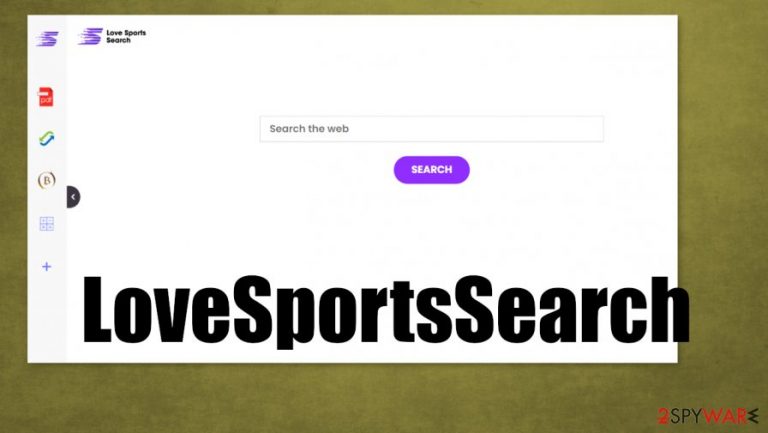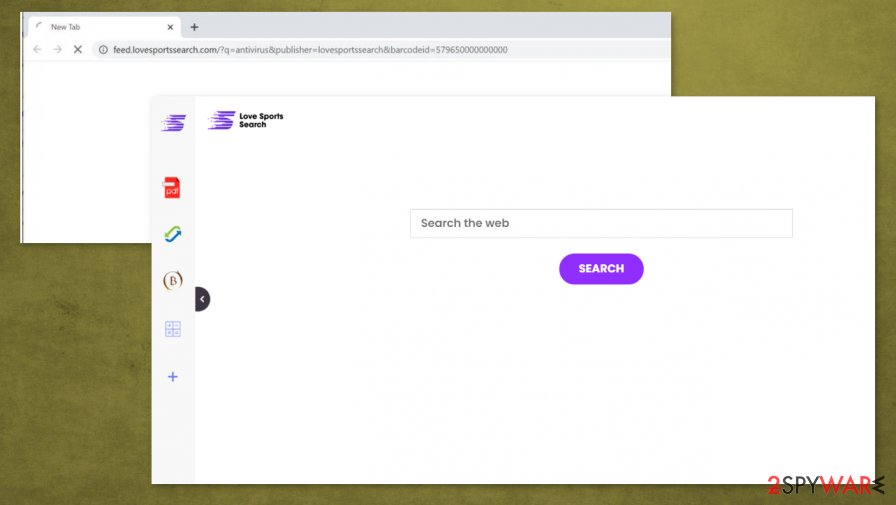LoveSportsSearch (Free Guide) - Chrome, Firefox, IE, Edge
LoveSportsSearch Removal Guide
What is LoveSportsSearch?
LoveSportsSearch – a browser hijacker that redirects your searches and inserts ads

LoveSportsSearch is a browser hijacker that changes various browser settings, like the home page and the new tab preferences, and directs all search queries through a newly assigned system search engine – lovesportssearch.com. The new default search engine is a fake search site due to the fact that it doesn't generate any search results itself. It redirects all inquiries to search.yahoo.com.
The browser hijacker is categorized as a potentially unwanted program (or PUP for short) due to the stealthy distribution and installation techniques. Most PUPs are installed on devices without direct permission. On top of that, browser hijackers are capable of collecting browsing and personal data, including IP addresses, visited sites, search queries, geolocations, and so on. This compiled information might be shared with third parties for marketing purposes, thus resulting in privacy issues.
| name | LoveSportsSearch browser hijacker |
|---|---|
| type | Browser hijacker |
| symptoms | All search inquiries go through lovesportssearch.com to search.yahoo.com. The new tab and home page settings are changed to the promoted search engine. |
| Risks | Browser hijackers could redirect users to malicious third-party sites. Also, these PUPs gather and might sell the user's private and browsing data. |
| Distribution | Deceptive ads, Software bundles |
| Removal | Uninstall the hijacker either manually with our free guide at the bottom of this article or with the help of reliable anti-malware software |
| system fix | Make sure to run a full system check with the FortectIntego app to make sure there are no hazardous changes made to the system settings |
Although browser hijackers aren't defined as malware,[1] that is not to say that no harm might come the users' way. Apart from the fact that it might collect and then sell private and browsing info, it might redirect its users to various malicious sites.
This browser hijacker might be on your device in two forms, either as a browser extension or as software (or both). If you've installed this software and are no longer satisfied with it, or if you have no idea how it got into your computer, then remove LoveSportsSearch with our free instructions provided at the bottom of this article. Although, if you had to deal with extension elimination before, this process should not be too difficult for you.
Remember to scan your device with a trustworthy anti-malware software like SpyHunter 5Combo Cleaner or Malwarebytes to make sure that LoveSportsSearch removal was successful and that no additional PUPs or malware found its way while you were using the browser hijacking application.

Since PUPs can make modifications to system settings, which may lead to unstable device behavior, experts[2] recommend scanning your device with a powerful system tool like the FortectIntego app and reverting any possible changes that the the unwanted app might have done.
LoveSportsSearch is not the only browser hijacker that stems from this family – its developers previously created almost identical apps known as ProStreamsSearch, HDMusicStreamSearch, TopSportsSearch, ProSearchConverter, and many others.
Most popular methods of potentially unwanted programs distribution
Potentially unwanted programs (PUPs) can be spread using at least a couple of ways, but the most common distribution method is software bundling.[3] When downloading software, not from original distributors, users might end up with a software bundle, meaning that additional applications are offered with the original app.
These bundles might contain any number of PUPs, but our research suggests that usually 2 additional applications are offered. If the user chooses Standard or Quick setup, then all of these PUPs are automatically installed because all boxes opting in for the installation are preselected.

Users should always pick the Custom or Advanced installation mode because only then they can deselect all the pre-ticked boxes and evade PUPs from installing on their devices. Moreover, try to download software from legitimate developers, they very rarely use software bundling.
LoveSportsSearch removal tutorial for all devices
Although potentially unwanted programs like LoveSportsSearch virus isn't as hazardous as malware, it still poses a risk for its users. When using this browser hijacker people could become victims of cybercrime because of browsing and personal data collection and possible redirections to malicious sites.
That's why we recommend users to remove LoveSportsSearch from their devices before more harm came their way. We are providing a free guide on how to do it just below this paragraph. After you uninstall the browser hijacker, scan your system with reliable anti-malware tools to make sure there are no additional PUPs or malware on your device.
PUPs commonly insert themselves into the system registry and might change other core system settings, so a system tune-up is in order. Use powerful system repair or tweaking tools to get all the original settings/values back to their normal state.
You may remove virus damage with a help of FortectIntego. SpyHunter 5Combo Cleaner and Malwarebytes are recommended to detect potentially unwanted programs and viruses with all their files and registry entries that are related to them.
Getting rid of LoveSportsSearch. Follow these steps
Uninstall from Windows
Make sure to get rid of the shady programs installed on your Windows computer by following these steps:
Instructions for Windows 10/8 machines:
- Enter Control Panel into Windows search box and hit Enter or click on the search result.
- Under Programs, select Uninstall a program.

- From the list, find the entry of the suspicious program.
- Right-click on the application and select Uninstall.
- If User Account Control shows up, click Yes.
- Wait till uninstallation process is complete and click OK.

If you are Windows 7/XP user, proceed with the following instructions:
- Click on Windows Start > Control Panel located on the right pane (if you are Windows XP user, click on Add/Remove Programs).
- In Control Panel, select Programs > Uninstall a program.

- Pick the unwanted application by clicking on it once.
- At the top, click Uninstall/Change.
- In the confirmation prompt, pick Yes.
- Click OK once the removal process is finished.
Delete from macOS
Remove items from Applications folder:
- From the menu bar, select Go > Applications.
- In the Applications folder, look for all related entries.
- Click on the app and drag it to Trash (or right-click and pick Move to Trash)

To fully remove an unwanted app, you need to access Application Support, LaunchAgents, and LaunchDaemons folders and delete relevant files:
- Select Go > Go to Folder.
- Enter /Library/Application Support and click Go or press Enter.
- In the Application Support folder, look for any dubious entries and then delete them.
- Now enter /Library/LaunchAgents and /Library/LaunchDaemons folders the same way and terminate all the related .plist files.

Remove from Microsoft Edge
Delete unwanted extensions from MS Edge:
- Select Menu (three horizontal dots at the top-right of the browser window) and pick Extensions.
- From the list, pick the extension and click on the Gear icon.
- Click on Uninstall at the bottom.

Clear cookies and other browser data:
- Click on the Menu (three horizontal dots at the top-right of the browser window) and select Privacy & security.
- Under Clear browsing data, pick Choose what to clear.
- Select everything (apart from passwords, although you might want to include Media licenses as well, if applicable) and click on Clear.

Restore new tab and homepage settings:
- Click the menu icon and choose Settings.
- Then find On startup section.
- Click Disable if you found any suspicious domain.
Reset MS Edge if the above steps did not work:
- Press on Ctrl + Shift + Esc to open Task Manager.
- Click on More details arrow at the bottom of the window.
- Select Details tab.
- Now scroll down and locate every entry with Microsoft Edge name in it. Right-click on each of them and select End Task to stop MS Edge from running.

If this solution failed to help you, you need to use an advanced Edge reset method. Note that you need to backup your data before proceeding.
- Find the following folder on your computer: C:\\Users\\%username%\\AppData\\Local\\Packages\\Microsoft.MicrosoftEdge_8wekyb3d8bbwe.
- Press Ctrl + A on your keyboard to select all folders.
- Right-click on them and pick Delete

- Now right-click on the Start button and pick Windows PowerShell (Admin).
- When the new window opens, copy and paste the following command, and then press Enter:
Get-AppXPackage -AllUsers -Name Microsoft.MicrosoftEdge | Foreach {Add-AppxPackage -DisableDevelopmentMode -Register “$($_.InstallLocation)\\AppXManifest.xml” -Verbose

Instructions for Chromium-based Edge
Delete extensions from MS Edge (Chromium):
- Open Edge and click select Settings > Extensions.
- Delete unwanted extensions by clicking Remove.

Clear cache and site data:
- Click on Menu and go to Settings.
- Select Privacy, search and services.
- Under Clear browsing data, pick Choose what to clear.
- Under Time range, pick All time.
- Select Clear now.

Reset Chromium-based MS Edge:
- Click on Menu and select Settings.
- On the left side, pick Reset settings.
- Select Restore settings to their default values.
- Confirm with Reset.

Remove from Mozilla Firefox (FF)
Remove dangerous extensions:
- Open Mozilla Firefox browser and click on the Menu (three horizontal lines at the top-right of the window).
- Select Add-ons.
- In here, select unwanted plugin and click Remove.

Reset the homepage:
- Click three horizontal lines at the top right corner to open the menu.
- Choose Options.
- Under Home options, enter your preferred site that will open every time you newly open the Mozilla Firefox.
Clear cookies and site data:
- Click Menu and pick Settings.
- Go to Privacy & Security section.
- Scroll down to locate Cookies and Site Data.
- Click on Clear Data…
- Select Cookies and Site Data, as well as Cached Web Content and press Clear.

Reset Mozilla Firefox
If clearing the browser as explained above did not help, reset Mozilla Firefox:
- Open Mozilla Firefox browser and click the Menu.
- Go to Help and then choose Troubleshooting Information.

- Under Give Firefox a tune up section, click on Refresh Firefox…
- Once the pop-up shows up, confirm the action by pressing on Refresh Firefox.

Remove from Google Chrome
You might need to reset the browser fully to default settings
Delete malicious extensions from Google Chrome:
- Open Google Chrome, click on the Menu (three vertical dots at the top-right corner) and select More tools > Extensions.
- In the newly opened window, you will see all the installed extensions. Uninstall all the suspicious plugins that might be related to the unwanted program by clicking Remove.

Clear cache and web data from Chrome:
- Click on Menu and pick Settings.
- Under Privacy and security, select Clear browsing data.
- Select Browsing history, Cookies and other site data, as well as Cached images and files.
- Click Clear data.

Change your homepage:
- Click menu and choose Settings.
- Look for a suspicious site in the On startup section.
- Click on Open a specific or set of pages and click on three dots to find the Remove option.
Reset Google Chrome:
If the previous methods did not help you, reset Google Chrome to eliminate all the unwanted components:
- Click on Menu and select Settings.
- In the Settings, scroll down and click Advanced.
- Scroll down and locate Reset and clean up section.
- Now click Restore settings to their original defaults.
- Confirm with Reset settings.

Delete from Safari
Remove unwanted extensions from Safari:
- Click Safari > Preferences…
- In the new window, pick Extensions.
- Select the unwanted extension and select Uninstall.

Clear cookies and other website data from Safari:
- Click Safari > Clear History…
- From the drop-down menu under Clear, pick all history.
- Confirm with Clear History.

Reset Safari if the above-mentioned steps did not help you:
- Click Safari > Preferences…
- Go to Advanced tab.
- Tick the Show Develop menu in menu bar.
- From the menu bar, click Develop, and then select Empty Caches.

After uninstalling this potentially unwanted program (PUP) and fixing each of your web browsers, we recommend you to scan your PC system with a reputable anti-spyware. This will help you to get rid of LoveSportsSearch registry traces and will also identify related parasites or possible malware infections on your computer. For that you can use our top-rated malware remover: FortectIntego, SpyHunter 5Combo Cleaner or Malwarebytes.
How to prevent from getting browser hijacker
Stream videos without limitations, no matter where you are
There are multiple parties that could find out almost anything about you by checking your online activity. While this is highly unlikely, advertisers and tech companies are constantly tracking you online. The first step to privacy should be a secure browser that focuses on tracker reduction to a minimum.
Even if you employ a secure browser, you will not be able to access websites that are restricted due to local government laws or other reasons. In other words, you may not be able to stream Disney+ or US-based Netflix in some countries. To bypass these restrictions, you can employ a powerful Private Internet Access VPN, which provides dedicated servers for torrenting and streaming, not slowing you down in the process.
Data backups are important – recover your lost files
Ransomware is one of the biggest threats to personal data. Once it is executed on a machine, it launches a sophisticated encryption algorithm that locks all your files, although it does not destroy them. The most common misconception is that anti-malware software can return files to their previous states. This is not true, however, and data remains locked after the malicious payload is deleted.
While regular data backups are the only secure method to recover your files after a ransomware attack, tools such as Data Recovery Pro can also be effective and restore at least some of your lost data.
- ^ What is Malware?. Paloaltonetworks. American multinational cybersecurity company.
- ^ Vayarasa. Vayarasa. Spyware and security news.
- ^ Product bundling. Wikipedia. The free encyclopedia.
